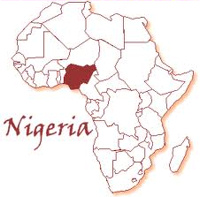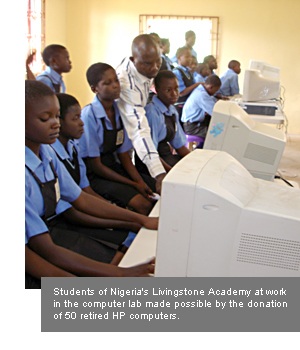Reflections on the Assembly, and elements of spiritual abuse
Nigeria Assemblies
Current Status
Samuel's Message
Reported Abuses in the Otukpo Assemblies
Livingstone Academy
History of Samuel Ochenjele's Ministry
Current Status
 Samuel
Ochenjele began his Assembly ministry in
association with George Geftakys in the early 1980's
(see Samuel's history below). Although George
is no longer welcome, Samuel is continuing to lead the Assemblies of believers,
numbering about fifteen groups in 2003,
in Otukpo and surrounding villages. He heads up other endeavors as well, such as
Livingstone Academy.
Samuel
Ochenjele began his Assembly ministry in
association with George Geftakys in the early 1980's
(see Samuel's history below). Although George
is no longer welcome, Samuel is continuing to lead the Assemblies of believers,
numbering about fifteen groups in 2003,
in Otukpo and surrounding villages. He heads up other endeavors as well, such as
Livingstone Academy.
Samuel did not announce George's excommunication from the Assembly in Fullerton, CA. He told the people that George no longer visits Nigeria because he is retired. Samuel has known this is not the case since he visited the US in October, 2003. For details about his position on the issue, read Steve Irons's account of that visit.
Samuel continues to visit the U.S. His son George is married the daughter of the Chris Millers of Oakland, IL, former members of the Tuscola Geftakys Assembly.
Reported Abuses in the Otukpo Assemblies
After the collapse of the Geftakys Assembly ministry this website received a lengthy unsolicited letter about abuses perpetrated by Samuel in the Otukpo Assemblies. The writer did not at the time want the letter to be published for fear of retribution. We were able to verify most of the information by observers in Otukpo, and it was agreed later that a summary of the report would be appropriate. The allegations include diversion of funds, lies and suppression of the truth, and abuse of spiritual authority.
Livingstone Academy
 The
Geftakys ministry provided backing to begin the for-profit school
for aids orphans. Samuel continues to receive donations from the USA
for Livingstone Academy. The school is the targeted recipient of aid from
Pilgrims Provisions Ministries, a non-profit charitable
organization begun in 2008 by Tim and Ginger Getakys,
Mark Miller and Mike Struven. In addition to financial assistance
PPM also sends professionals to provide on-site help. As Ginger is
an instructor of teachers, it may be supposed that she is advising
Livingstone in this capacity. Elements of her approach to education
are evident in how she ran
Cornerstone Academy in California from 1982 to 2004.
The
Geftakys ministry provided backing to begin the for-profit school
for aids orphans. Samuel continues to receive donations from the USA
for Livingstone Academy. The school is the targeted recipient of aid from
Pilgrims Provisions Ministries, a non-profit charitable
organization begun in 2008 by Tim and Ginger Getakys,
Mark Miller and Mike Struven. In addition to financial assistance
PPM also sends professionals to provide on-site help. As Ginger is
an instructor of teachers, it may be supposed that she is advising
Livingstone in this capacity. Elements of her approach to education
are evident in how she ran
Cornerstone Academy in California from 1982 to 2004.
There are other contributors to Livingstone. The USC Marshall School of Business contributed computers in 2004, at the behest of Pam Harris:
...Former Marshall School of Business student Pamela Harris ('04) put the wheels in motion for the computers to be donated to the Livingstone Academy, when professor Shook mentioned that the school was about to recycle them. Harris knew about the school through her church, which had been assisting the academy.
Two of the Sjogren boys in Omaha raised money on a regular basis for what their local newspaper called an orphanage for children with AIDS in Africa. This would seem to be referring to the orphans attending Livingstone Academy. Brent T. and "Anonymous in Nigeria" comment on this. Samuel is invited to preach at the former Geftakys Assembly in Chicago.
Medical Equipment Fiasco
Dr. Sunday Ochenjele is Samuel's younger brother a believer, but is not involved in the Otukpo Assembly. In 2001, the Geftakys team visited the building site of Dr. Sunday Ochenjele's private medical clinic. Unsolicited by Dr. Ochenjele, the team promised to provide some medical equipment for his clinic, which would also be used by a future Geftakys medical team. Samuel gave assurances that he had government contacts to get the donated items through customs duty-free. They also offered to help put a roof on the building, which Dr. Sunday declined.
It was then published in the USA in the Believers Prayer Letter that "the Assembly is building a hospital in Otukpo, Nigeria, under the medical direction of Dr. Sunday Ochenjele." Sunday emailed the editor a vigorous protest that it was his privately owned hospital, not associated with the Assembly. The erroneous statement was corrected in the next issue.
The Geftakys medical team, which included Dr. Tom Hines, Dr. Gordon Kim,
Wayne Mathews, P.A., and Jerry Starr, R.N., arrived and conducted ten days of
free medical service to the community, but the promised equipment had not yet
been delivered. When the shipment did arrive, 3 million naira (about $23,00)
import duty was levied. G.G. and Samuel asserted that Dr.
Sunday had retained an attorney over the matter, in order to claim the
equipment for himself. Therefore they
refused to assist with the fees. Dr. Sunday had not gotten a lawyer. He did
not know of this allegation, but went ahead and secured a personal loan to cover
the fees. It was discovered that most of the
medical equipment had been damaged, and all the drugs had to be
destroyed because they were outdated, due to customs delays, both in the
U. S. and in Nigeria. The Assemblies and the Geftakys team completely
distanced themselves from the situation, refused to investigate the condition of
the equipment and the drugs, and publicly alleged that Samuel
had swindled them out of 100 million naira worth of medical equipment
and supplies.
Wayne Mathews commented on this sad situation.
Dr. Ochenjele
says, "I have never hired a lawyer in my life and did not do so during the
unfortunate equipment crisis either. I wonder why the Assembly would leave
equipment that Samuel values at 100 million
naira with me, seeing I am not part of their gathering....I am waiting
for the refund of the amount I paid in custom duties, and I will gladly
turn over every bit of the equipment to the Assembly. My deep apology to
all those who sincerely served the Lord with the donation of the
equipment."
It was evident that George Geftakys' offers of gifts and financial help had been intended to gain control over the hospital and secure Dr. Sunday's loyalty. "Recprocity" is a well known element in the use of undue influence - the recipient becomes obligated. Dr. Sunday discerned this trap and avoided it as best he could. It looks as though GG and Samuel refused to help him with the customs fees when they understood that he was not going to allow them to take control of his clinic through gifts. They were not going to be able to add "medical clinic" to their prestige and use it as another means, in addition to the school, by which to solicit further funds and donations from America.
History of Samuel Ochenjele's Ministry
 Samuel Ochenjele
was a soldier under the military police in Bauchi State. In 1979 he left
the military and settled in Otukpo in Benue
State in southeastern Nigeria. With a population of 140,000, Otukpo is
surrounded by agricultural villages, and is located forty-five miles
from the state capital, Makurdi.
Samuel Ochenjele
was a soldier under the military police in Bauchi State. In 1979 he left
the military and settled in Otukpo in Benue
State in southeastern Nigeria. With a population of 140,000, Otukpo is
surrounded by agricultural villages, and is located forty-five miles
from the state capital, Makurdi.
 When
Samuel Ochenjele left the military in northern Bauchi State in 1979
he relocated to Otukpo in southeastern Nigeria. There he joined a
non-denominational group of believers who were coming together to
promote evangelism throughout Nigeria. At first the community called the
group ogbolojo, "those who listen to the word of God". When they
organized formally in 1982 they became Christian Evangelical Fellowship of
Nigeria. At that time CEFN focused particularly on reaching illiterate
village people through the use of videos.
When
Samuel Ochenjele left the military in northern Bauchi State in 1979
he relocated to Otukpo in southeastern Nigeria. There he joined a
non-denominational group of believers who were coming together to
promote evangelism throughout Nigeria. At first the community called the
group ogbolojo, "those who listen to the word of God". When they
organized formally in 1982 they became Christian Evangelical Fellowship of
Nigeria. At that time CEFN focused particularly on reaching illiterate
village people through the use of videos.
Justice James Ogebe in Lagos (who retired from the bench in 2010) had a strong interest in evangelism. In 1981 he called for and financially backed a meeting of all evangelists in Benue State to strengthen outreach to rural areas; Samuel met Justice James at this meeting. Afterward an American invited Samuel to come to the U.S. to buy a projector and films. James gave Samuel his blessing on this undertaking, along with promises from Psalm 34. The American turned out to be a disappointment, but Samuel met Roger Grant, a leading brother in the Geftakys Chicago Assembly, who introduced him to George Geftakys.
George Geftakys first visited Nigeria in 1981. Subsequently, a controversy arose between Samuel and the CEFN brethren regarding financial gifts given by the American brethren. Some claimed Samuel had diverted the funds, and the group was split. Samuel left the group with a handful of people, successfully winning GG to his side.
Those who left CEFN with Samuel, along with James Ogebe and a few families involved in his evangelistic work, came into the sphere of the Geftakys' ministry. Samuel was the recognized Leading Brother, and the groups became known as "Assemblies".
G.G. gave Samuel money to support his ministry in Otukpo, and also to refurbish his house for GG's comfort when he visited. Consequently, Samuel's standard of living was improved above the general level of the people and he is considered wealthy. As one example, his house has an indoor shower. American money has caused contention and hard feelings among the people of Otukpo, who refer negatively to the Geftakys team as "the big Americans".